The latest surveys and statistics show that older adults are increasingly becoming comfortable with social media use. They are gradually becoming social media users but have restricted themselves to mostly Facebook.
If you wonder why do elderly not use social media, let us discuss the latest statistics and reasons why the elderly are not using most of the social media platforms as much as the younger generations.
What Percentage of Seniors Use Social Media?
According to the 2023 Tech Trends report by AARP, 88% of 50 years and older adults used at least one social media platform in 2022. While Facebook and YouTube remained their favorite social media networks, Instagram and TikTok also showed significant growth.
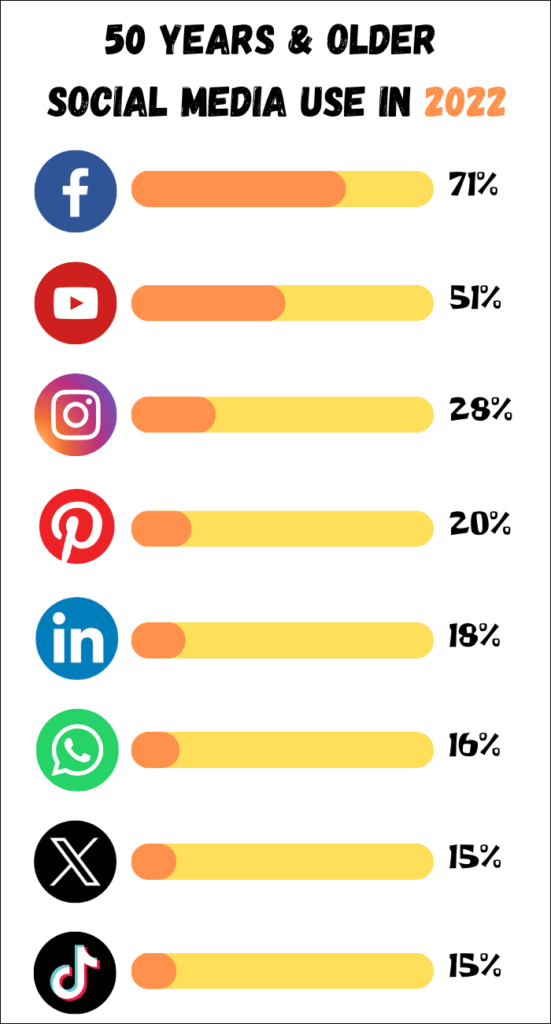
The survey also suggests that 50 years and older are using social media as one of the forms of communication to stay connected with others.
Social media is used way more than video calls and almost the same as email to stay connected, a trend that remained steady between 2020 and 2022.
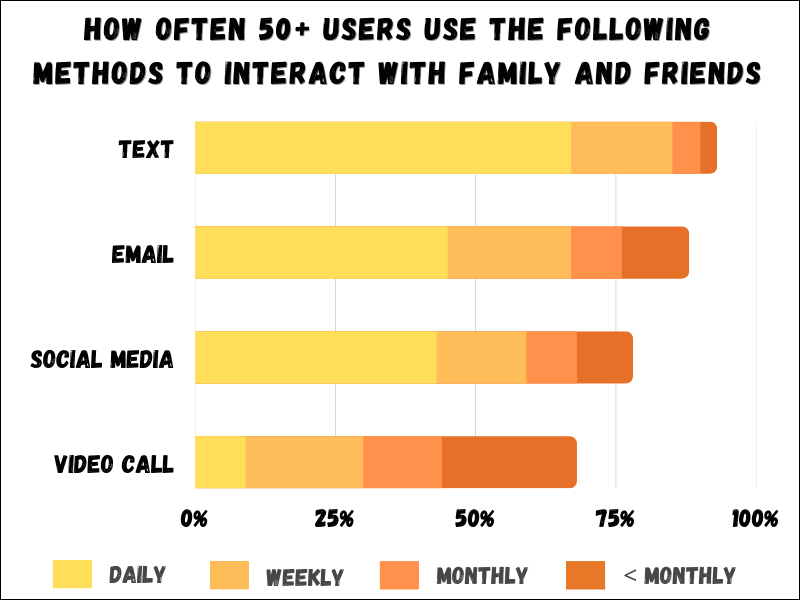
Pew Research studied social media use among older adults for more than a decade. According to Pew Research’s 2022 report, although seniors do not use social media as much as younger consumers, there is significant growth in social media usage among them from 2010 to 2021.
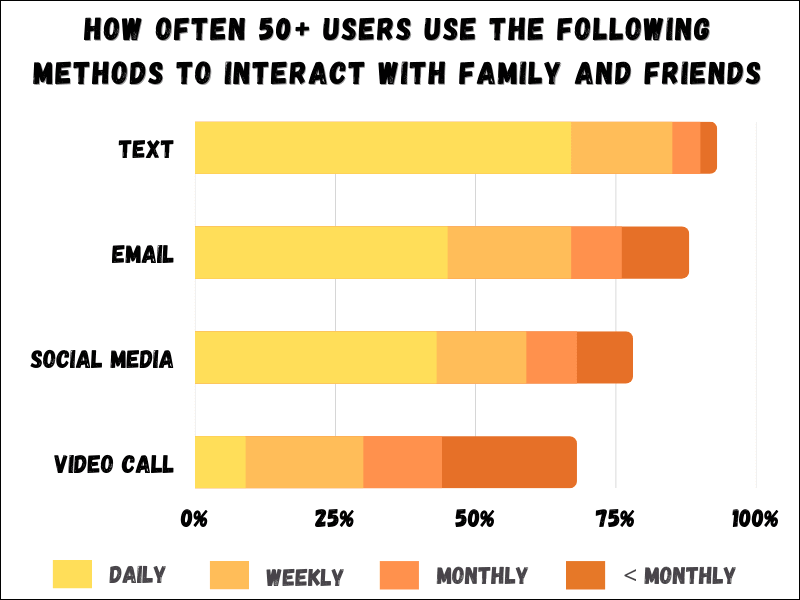
So, when you see the numbers to find out how many older adults use social media, they look promising and show older generation’s growing comfort and acceptance of social media.
It is also clear from trends that the elderly (65+) are slow in social media adoption, as compared to 50 to 64 years age group.
Older Generation and Social Media – The Statistics
Now, let us look at the different social media platforms usage among seniors, compared to the younger generations.
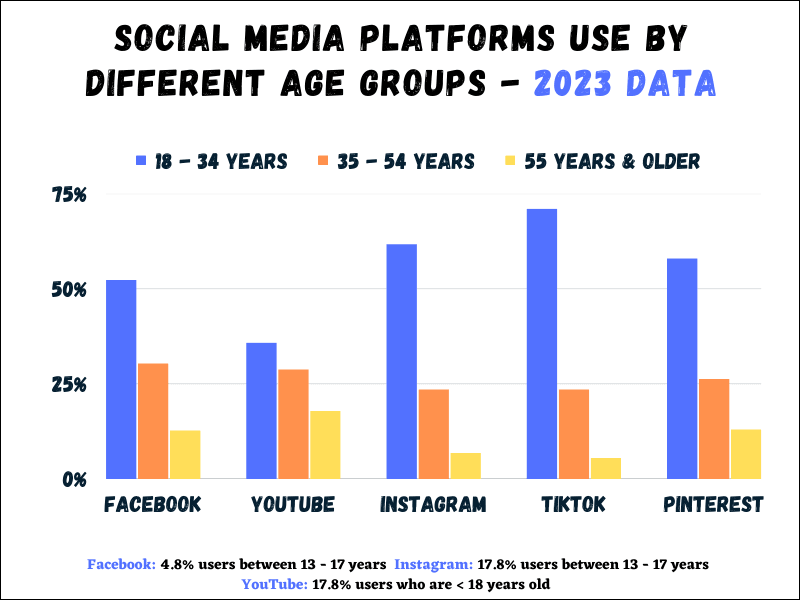
The above numbers show that although seniors are using social media, they have restricted themselves to Facebook and YouTube.
Know more about what social media platforms do seniors use.
So, here are 5 takeaways from all the latest surveys and data.
- Social media use is low among older adults, as compared to the younger generations
- Social media usage is growing among the elderly
- Facebook is the clear favorite of the older generation, YouTube is the second favorite social media platform
- Instagram and TikTok are becoming popular among the elderly. As TikTok gains traction with seniors, older TikTok creators are in demand by brands
- Facebook and YouTube’s popularity, and now increasing use of Instagram and TikTok, shows seniors love photos and video content.
As most seniors are using social media to connect with family and friends, it makes sense that Facebook is their go-to platform.
Facebook’s massive community means they can follow their loved ones’ life updates and interact with their college friends who live afar.
Why Do Elderly Not Use Social Media? – 7 Reasons
Let’s discuss the reasons why seniors are not using most social media platforms as much as the younger generations.
1: Technology Adoption Gap Between Seniors and Younger Adults
Adoption of smartphones and tablets has grown remarkably among seniors, since about a decade ago and the gap between younger and older adults has narrowed.
However, the statistics show that there is still a notable difference in tech use between adults (under 30s) and those 65 years and older.
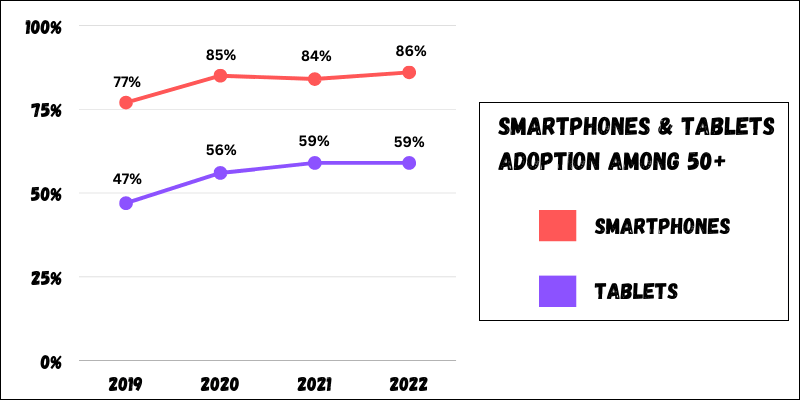
The surveys show that social media use is growing on par with smartphone and tablet adoption among older adults.
According to the AARP’s 2023 survey, the 50+ folks highlighted the following barriers to technology adoption.
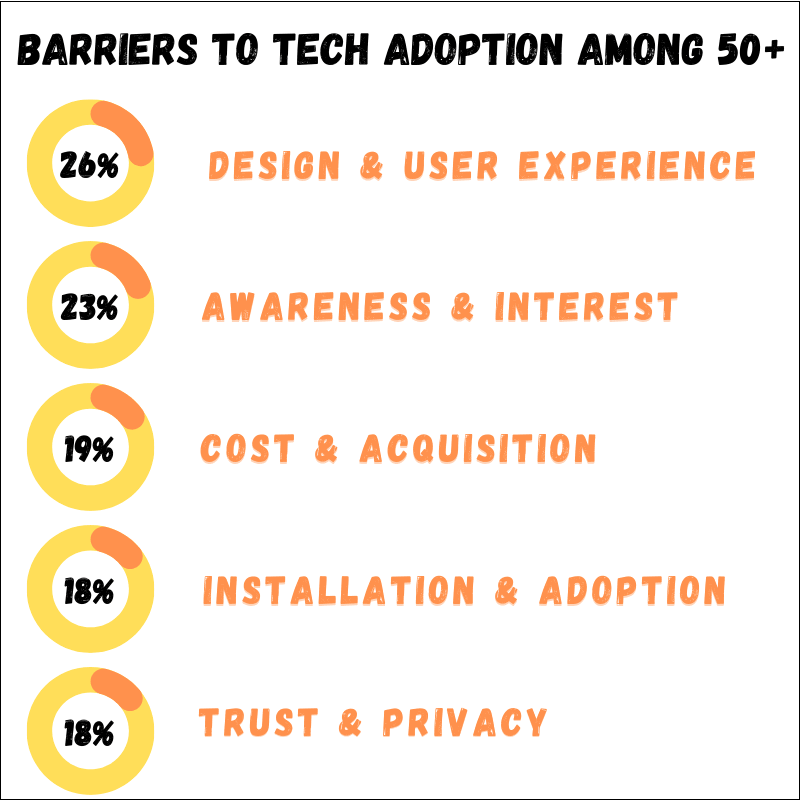
- Designed for Younger Generations: Modern tech and devices are designed for younger generations and tech-savvy people
- Complicated User Interface: Seniors feel overwhelmed as modern tech devices are complicated and the user interface is not senior-friendly (small buttons and controls)
- Seniors Need Training/ Instructions: Many seniors complained that there is no hardcover instruction manual with devices. They need instructions and training to use new tech.
- Cost and Acquisition: The costs of some of the modern gadgets are too high. It is not easy to keep up with new releases
- Trust and Privacy: Seniors are also concerned about privacy issues. They are not sure what personal data the modern devices collect. There are also concerns about identity theft and scams.
There are many other reasons why elderly struggle with technology.
2: Many Seniors Still Prefer Traditional Media
Two of the main reasons people use social media are for entertainment and news. Many seniors still prefer TV and newspapers for entertainment and news.
According to the latest statistics, 50% of 65 years and older Americans are cable subscribers compared to 34% of 18 to 34 years old.
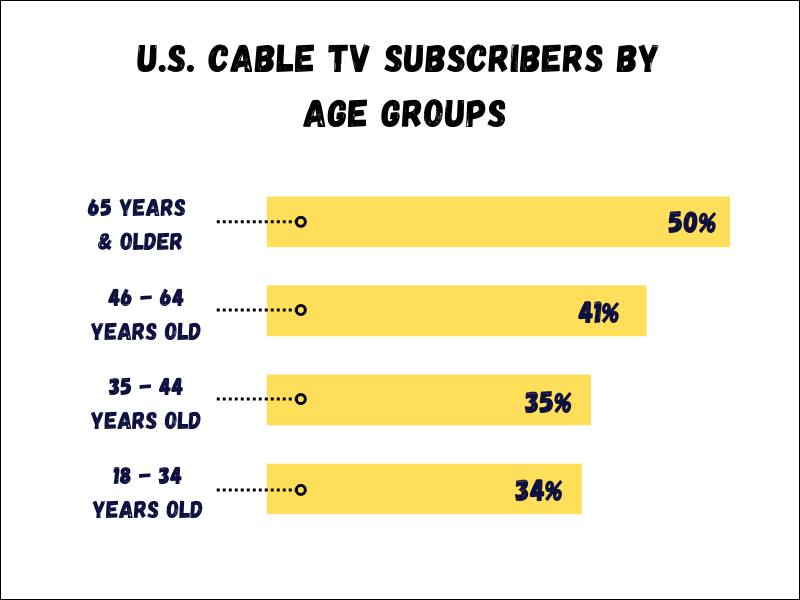
According to Statista, 21% of 65 years and older adults use newspapers as their primary source of news.
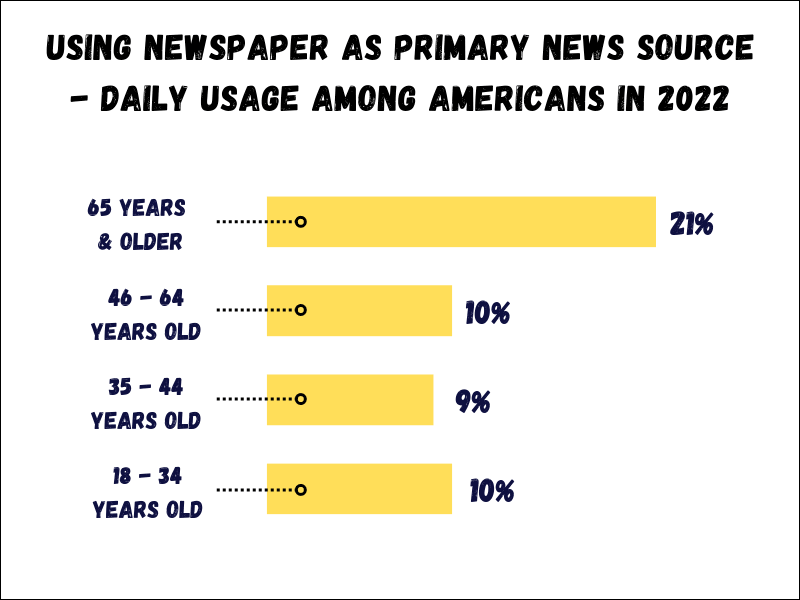
Newspaper is among the least-used daily news sources among younger generations.
3: Online Scams and Privacy Issues
According to Consumer Affairs, more than 3.4 million older adults are victims of financial scams each year, suffering more than $3 billion in loss.
The scammers use phone calls and internet for most of these scams.
Seniors are more vulnerable as compared to other age groups because they are less tech-savvy and are less likely to spot an online scam.
One of the main barriers to tech adoption among seniors, according to the AARP survey, is trust and privacy issues. Older adults are concerned about identity theft and online safety.
When identifying the reasons of why do elderly not use social media, online scams, and identity theft are some of the biggest turnoffs for seniors.
4: Lack of Understanding and Technical Limitations
Some seniors do not understand how different social media platforms work and what it takes to use them.
They do not have the technical knowledge to record videos for TikTok and take good photos for Instagram.
The learning curve can be frustrating for many seniors so they simply avoid social media and do not feel the need to join.
5: They Feel social media is for Younger Generations
Many seniors associate the latest social media platforms, like TikTok and Instagram, with youth. They feel older adults do not belong there.
Although most of the social media influencers are millennials and Gen Z, trends are changing. We are witnessing the rise of senior influencers on Instagram and TikTok.
The latest trends show that older adults are gradually accepting these modern social media platforms.
6: They Do Not Understand the Benefits of Social Media Use
One of the reasons seniors avoid social media is because they do not feel the need or see any benefit of using these platforms.
Social media platforms can be beneficial for the elderly in many ways, like.
- Interacting with family and friends that they do not see in person regularly
- Social media can help the elderly to avoid social isolation, loneliness, and depression by engaging in online discussions
- There are endless entertainment opportunities on social media for older adults
- They can follow their favorite celebrities, fashion influencers, hobbies, and trends on social media
Seniors can use social media to remain in contact with friends who live afar and for entertainment, news, and learning.
7: Seniors Mostly Use Social Media to Stay Connected
The primary reason for senior’s social media use, according to different surveys, is to stay connected with family and close friends. This is the main reason why seniors are mostly active on Facebook only.
The second common reason is entertainment so YouTube is the second favorite social media platform among this age group.
These are the 7 main reasons why the elderly do not use most of the social media platforms as much as the younger generations.
5 Tips to Help Seniors Getting Started with Social Media
Social media use can help the elderly in many different ways and keeps them connected, informed, and entertained.
Here are some of the ways you can help older adults get started with social media use.
- Make sure they have the required tech/gadgets (smartphone or tablet) to use social media apps
- Explain the benefits of social media use including social interaction with friends and family, entertainment opportunities, and more
- Help them navigate the social media apps. Avoid information overload and start with one platform at a time.
- Address the online privacy issues and educate on never sharing personal information online with anyone they do not know in real life
- Educate about online scams including prize/lottery scams, tech support scams, online shopping scams, phishing scams, and charity scams
The seniors’ favorite social media platform is Facebook because of its massive community, so it’s best place to start and seniors can feel connected from day one.

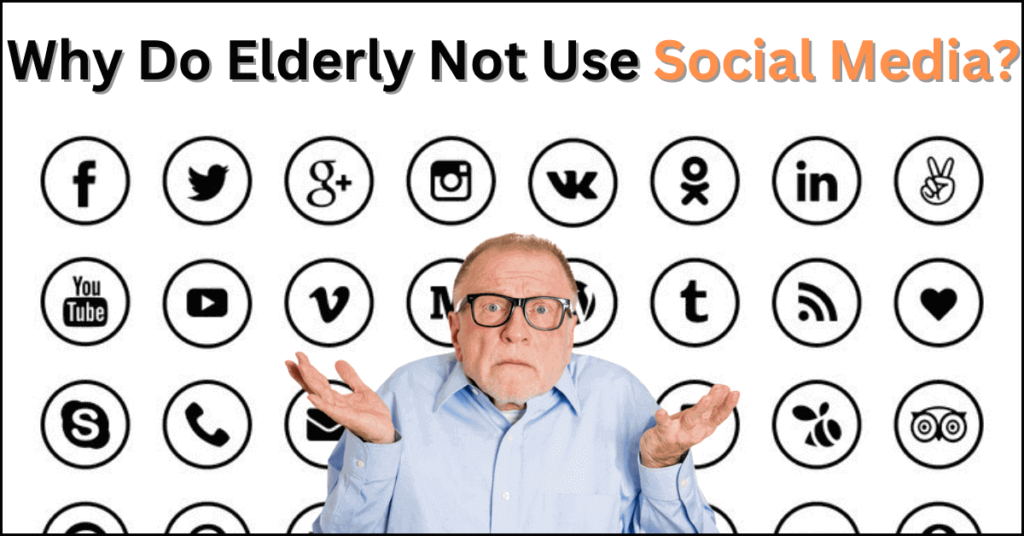
I am elderly and have already some skills picked up as I went along. I have a personal computer but would also like to make full use of a smart phone (other than just phoning friends). I’d like to read the newspapers online and to research books, etc, etc. I have done other adult studies in recent years but neglected this all important area. I am not afraid of hard effort and would like to reach a good level of competence. What sort of course would I need? Thanks.